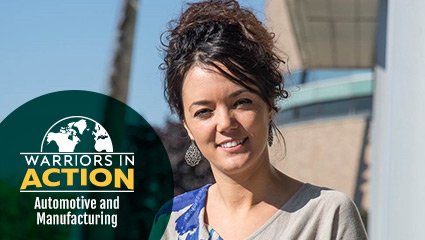Over the coming months, look for stories that feature some of the many Wayne State initiatives and pioneering individuals committed to automotive and manufacturing innovation. This content is part of WSU's Warriors in Action campaign highlighting how Wayne State is making a difference.
 Eranda Nikolla, assistant professor of chemical engineering and materials science in Wayne State’s College of Engineering, is committed to changing the way we think about our fuel sources.
Eranda Nikolla, assistant professor of chemical engineering and materials science in Wayne State’s College of Engineering, is committed to changing the way we think about our fuel sources.
As part of the National Science Foundation (NSF) Faculty Early Career Development (CAREER) Award, Nikolla is researching ways to improve energy efficiency and lessen environmental pollutants by reducing carbon dioxide (CO2) emissions. The CAREER Award, a five-year, nearly $406,000 grant, is the NSF’s most prestigious award for up-and-coming researchers in science and engineering.
Nikolla’s project, which launched in 2014, is titled “Tailoring the nature of the active site of Ni electrocatalysts for electrochemical co-reduction of CO2 and H2O.” The project focuses on developing technologies to activate reverse chemical pathways in which CO2 is reduced into high-energy molecules that can be used as precursors for the production of fuels and chemicals.
Through this research, Nikolla aims to find efficient and cost-effective ways of converting CO2 from chemical processes into hydrocarbons.
“In a current combustion engine, even in an ideal situation, only 25 to 30 percent of the fuel goes into actually running the car. Everything else just gets burned in the process,” she said. “Any way you look at it, you’re losing. The process is inefficient and generates high CO2 emissions. Replacing the internal combustion engine with more efficient fuel cell systems and finding ways to activate reverse chemical pathways to utilize emitted CO2 to generate valuable fuels and chemicals is imperative.”
The materials-based research also examines fuel cells as an alternative energy conversion technology. While the initial cost of fuel cells is higher than a traditional combustion engine, Nikolla said the process of converting chemical energy into electrical energy to power a car via fuel cells is still a more efficient process.
“The alternatives we’re looking at — whether its fuel cells, batteries or electrolysis cells — are still not fully optimized when you compare them to the combustion engine,” she said. “There’s definitely a future, though, in these technologies. We’ve got to view CO2 emissions as a threat, and we have to think of future generations.”
Nikolla, whose other research interests include materials for energy generation and storage and the design of multifunctional, selective catalysts for biomass conversion, has been the recipient of multiple awards, including the U.S. Department of Energy Early Career Award, Wayne State University’s Junior Faculty Award and the Camille Dreyfus Teacher-Scholar Award.
To learn more about Nikolla’s research, visit her research group’s website.
